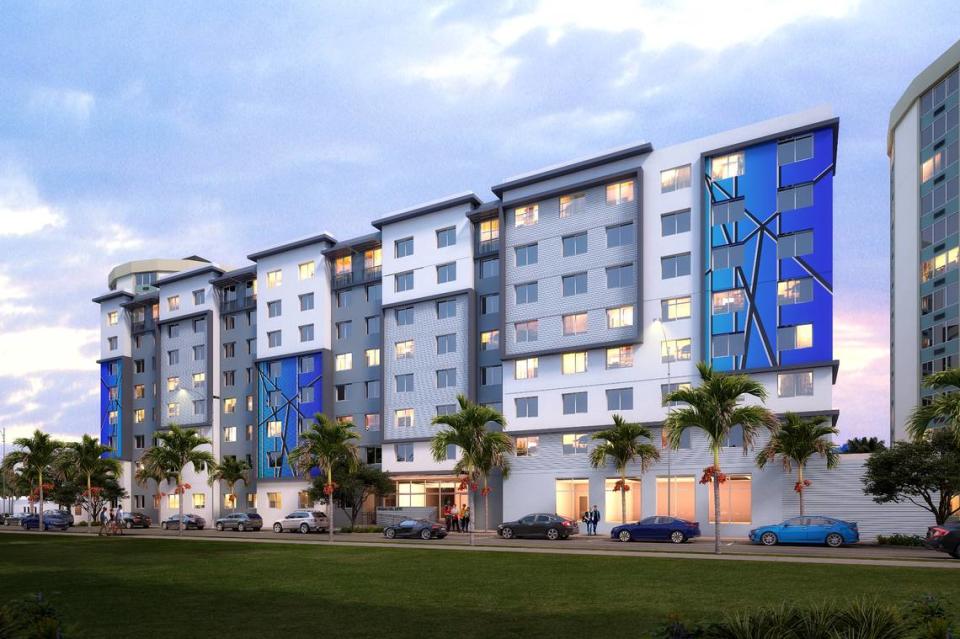Miami is getting two new affordable housing projects, both inside Opportunity Zones
Miami’s housing affordability crisis got a promise of relief Thursday with the groundbreaking of two projects that will bring hundreds of units to the city.
The pair of developments — one in Allapattah, the other near the Omni — are the first in the county to leverage tax breaks and other incentives offered by Opportunity Zones, created as part of the federal 2017 Tax Cuts and Jobs Act to spur development in economically-deprived areas. The program designated 8,764 such zones nationwide; Miami-Dade has 67 and Broward has 30.
“A lot of people are not familiar with the tools that are available in order to use Opportunity Zones successfully,” said Secretary of Housing and Urban Development Ben Carson, who attended both groundbreaking ceremonies and spoke with the Herald.
“Like any new program, people will start to use them more once they see what other people are doing,” Carson said.
In Allapattah, Related Urban Development Group launched the eight-story Brisas del Este, which will add 120 new affordable and workforce housing units to the existing Three Round Towers site at 2920-2940 NW 18th Ave.
Two of the three towers, which were built in 1970, are part of the $106 million project and will undergo complete rehabilitation, bringing the total of new affordable units to 383.

One of the towers was extensively renovated in 2018 and currently houses senior citizens.
“This is the largest project of its kind in the country,” said Michael Liu, director of the Miami-Dade Public Housing and Community Development Department, which helped fund the project. “It shows that affordable housing can indeed work inside Opportunity Zones.”
Just a couple of miles away, plans were unveiled for the UNI Tower, a mixed-use development featuring 252 affordable housing units, along with office and retail space, at 1640 NE First Ave. inside the Omni district.
The $75 million building, to be developed by Nir Shoshani and Ron Gottesmann of NR Investments, is expected to begin construction in November and generate 250 jobs.
A complex equation
In an interview with the Herald, Carson acknowledged the complexities of Opportunity Zones. Developers, he said, “know very broadly that there’s some tax relief associated with them. They don’t know there are special preferences for the types of grants people get, how much easier we make it to use the different programs by amalgamating the purposes for different agencies. Few of them know you can use Opportunity Zone funds to purchase low-income tax credits.

Each of the two new projects were assembled using different tools and resources. The Allapattah project uses a combination of Low Income Housing Tax Credits (LIHTC), available for affordable housing developers; federal Rental Assistance Demonstration (RAD) subsidies, which grant local public housing agencies funding to rehab existing stock; and a Purchase Money Mortgage (PMM) of $18 million from Miami-Dade County.
The Omni project uses $8.5 million in property-tax rebates and a $6.5 million grant from the city of Miami’s Omni Community Redevelopment Agency, along with the Opportunity Zone capital gain tax deferments. In exchange, the developer commits to limiting rents a portion of the apartments to levels affordable to people with low incomes, defined as 60 to 140 percent of the City of Miami’s median income of $49,930.
“Without the involvement of HUD and the CRA, this would not have been a mixed-income project,” said Mayor Francis Suarez. “It would have become another market-rate project. The City of Miami currently needs 50,000 affordable housing units to meet demand, and this will be 252 units in that direction.
“But what’s also important is this is a downtown project that would have normally been luxury condos or rentals because of its location,” Suarez said. “Teachers and police officers and firefighters would have never been able to afford living here. Now we have income restrictions and they’re voluntarily imposed by the developer because the financing worked. You mix the Opportunity Zone with a HUD-guaranteed loan and a CRA grant and you create a capital stack that works for the project and serves as a model for the rest of the country.”
Construction on both projects is scheduled to be completed in 2022.

